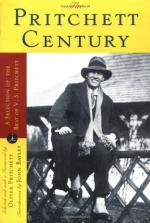|
This section contains 417 words (approx. 2 pages at 300 words per page) |

|
Pritchett writes as one who has been nourished rather than inhibited by his literary forebears. Though the tradition to which he belongs has shown signs of enfeeblement in recent years, with its writers too often manifesting a weakened grasp, a contracting range, Pritchett himself is able to confront Mrs. Thatcher's England with an almost Edwardian assurance of his right to move at ease among its phenomena, to seize upon what he wants, and to do so without apology or self-consciousness. He displays an undiminished faith in the existence of a substantial, knowable world external to himself—a world full of quirky types with whose perplexities his imagination can play. (p. 25)
Pritchett is the least snobbish of English writers, a clear-eyed but amiable democrat who treats his characters [in the collection "On the Edge of the Cliff"] with sublime fairness, playing no favorites, settling no scores. They are created...
|
This section contains 417 words (approx. 2 pages at 300 words per page) |

|


